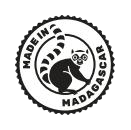Alomac: Healing wisdom of Madagascar comes to the world.
Madagascar. The island-nation home of lemurs, exotic chameleons, poisonous dart frogs and thousands of species of plants and animals found nowhere else on earth. Madagascar is also the home of Aloe macroclada—the healing plant used to produce Alomac.
The powers of Alomac go beyond its healing properties. Our approach here at our headquarters Mioty Voajanahary (the Malagasy name of the company) is one of stewardship of the environment and respect for the people of Madagascar. This respectful approach seems entirely appropriate given the gift to the world that is Aloe macroclada.
Respect for the land
No forests are ever cleared for growing Aloe macroclada. It is planted and cared for among existing flora as it would naturally grow, without pesticides or chemical fertilizers. In fact, our company is helping to restore forests in Madagascar and plants tens of thousands of trees every year, all surrounding Aloe macroclada.

Support for communities
Mioty Voajanahary partners with many villages and communities to grow and harvest Aloe macroclada. The plants are grown and harvested sustainably to ensure a consistent supply of Alomac. We pay our workers livable wages, including health benefits and Madagascar’s form of Social Security, helping to create stable communities.

Support for schools
Mioty Voajanahary supports local education. We work with grower cooperatives and negotiate contracts that ensure that each one gives an additional 10% of the growing and harvesting fees toward education in their communities. These critical dollars go specifically to teachers, schools, school lunches and books for the children. Each year we have at least one intern from the University of Antananarivo graduate program studying different aspects of growing vahona, the Malagasy name for Aloe macroclada. Their projects optimized growing conditions and techniques including mychorrizae symbiosis and seedling care.

Growing aloe, growing infrastructure
Since our founding in 2014, all eight villages where aloe is cultivated have schools and community buildings with teachers and books—each supported by Alomac. And it goes further: We also have several road and water projects under way.

A Resource that belongs to all
Aloe macroclada is a resource that belongs to the entire country. Alomac’s leadership were active participants in the development of Madagascar’s CBD (Convention on Biological Diversity) guidelines to develop and ensure sustainable practices and profit sharing for Madagascar. Alomac is the first product to get CBD approval from Madagascar’s Ministry of Environment.


